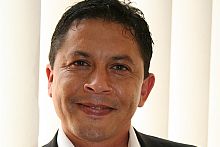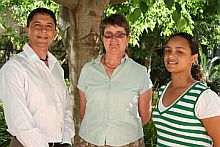Hadley Lyners - An (education outreach) officer and a gentleman
|
"If life gives you lemons, make lemonade, lemon curd, lemon tart, sell them, paint them, plant them to make more lemonade ..."
Hadley Lyners, the SAEON Fynbos Node's new Education Outreach Officer, is one of those remarkably creative and resourceful people who see endless possibilities in any situation, to the advantage of the people lucky enough to benefit from this creativity.
Talking to Hadley it quickly becomes evident that he also has a passion for education outreach, especially when it comes to nature and the environment. He clearly enjoys sharing his knowledge, expertise and enthusiasm with learners and their parents alike.
After graduating from the University of Cape Town where he obtained a BA degree in Environmental and Geographical Science as well as a Higher Diploma in Education, he started his career at Rosendal Primary School in Delft in the Western Cape in 1994. Not only did he teach all subjects from grade 4 to grade 7, but also acted as subject head, member of the school governing body and school representative for the Delft Police Forum and Delft Sports Board.
As if this wasn't enough, he also headed up an HIV/Aids awareness programme for all schools in Delft and established an HIV/Aids Committee in the area.
Outreach greening project
Moving on to Hoofweg Primary School in 2003, he once again became involved in a myriad of extra-curricular activities. One of these was an outreach greening project - a highly successful community-based garden supported by Lukholo Training Services, which he ran from the design and planting phase up to the point of job descriptions and wages for the five parents he employed to assist with the gardening.
With the help of the project sponsors, the estimated amount of R30 000 required to design, lay out and plant the garden, grew to R80 000. "This obviously pleased our Principal immensely," Hadley admits with a smile, "and also motivated parents and community members to help clear the site, a massive task considering that the site used to be a rubbish dump. The volunteers - which included the Principal - worked until past five in the evenings to get all the rubbish removed."
As gardening is a labour-intensive task, Hadley carefully considered his options so as not to overburden the primary school learners. In celebration of National Arbor Day, for instance, he brought in high school learners to assist their younger brothers and sisters to plant trees. He also ran a school environmental programme, for which he developed a learning programme to teach the learners about biodiversity loss.
He joined Melton Primary School in 2006 where, beside teaching grade 4 and 5, he coordinated the University of Western Cape's (UWC) life orientation project for the learners, started a school enviro club and developed a school-garden-based programme Conserving Cape sunbird and proteas at school.
"There was quite a large population of sunbirds in the school garden, and the learning programme encouraged learners to put up 'Protect our sunbirds' signs to make everyone aware of the importance of protecting the birds," he says.
Based on the success of his previous outreach greening project, he was requested to replicate his garden project at the new school. To accomplish the development of the school gardens, he enlisted the help of Kirstenbosch Botanical Gardens staff as well as local nurseries, hardware stores and other suppliers. They supported the projects by donating development funds, indigenous plants, compost, gardening equipment, crete fencing, garden furniture and bricks for the pathways.
To broaden the knowledge base of the learners, he brought in experts from Kirstenbosch as well as Rhodes University's Environmental Education and Sustainability Unit to teach the learners and the parents who showed interest in getting involved in the project.
Hadley himself completed several courses to learn more about environmental education and school-based gardens. These include Environmental Learning Programme Development for school-based gardens presented by the South African National Biodiversity Institute, a Cape Nature Invasive Alien Plants Awareness Programme, a plant propagation workshop presented by the UWC's Environmental Education Research Unit, "WE CARE project" presented by the University of Stellenbosch's Shuttleworth Environmental School, and a Goldfields Environmental Education Certificate and Advanced Certificate in environmental education from Rhodes University. Currently he is enrolled for Rhodes University's Master's Degree in Environmental Education.
"I picked up a lot of knowledge by getting involved in the practical side of school-based gardening and education outreach," he explains," but I wanted to get to know all I could about these projects so that I could offer the very best to the learners and the communities." The courses also assisted Hadley to get a broader perspective on environmental issues that he could pass on to the learners, such as the influence of crime on biodiversity.
Positive spin-offs
The gardening projects had several positive spin-offs. Several learners, including a boy who used to be one of the naughtiest pupils in the school, became dedicated to the project and instead of returning to an empty home in the afternoons, stayed after school for an hour or two to help in the garden. Sensing their interest, Hadley encouraged it by running workshops to teach them the correct methods of propagating and planting, educate them about the role of earthworms in fertilising the soil and make them aware of possible environmental problems in the schoolyard. Soon even smaller kids of 5 -6 years would come off the streets to join in and help.
With such dedication it comes as no surprise that Hadley and his helpers won the SANBI Greening the School Award for Hoofweg Primary. Both Hoofweg and Melton Primary Schools were moreover selected to attend five one-day workshops presented by SANBI.
Because most of the kids showed an interest in the garden and vegetable patch, Hadley was able to link it to the curriculum in many different ways. "I used it to explain concepts ranging from maths to science," he says.
"Another positive spin-off was the networks that I managed to put in place," Hadley continues. "It was really amazing how people from all walks of life rallied and assisted us."
A major highlight was the learners' discovery of a rare flower, a "Blou Afrikaner" in their own suburb.
And possibly the biggest spin-off of all - the vegetable patch provides food for learners and members of the community. The 48 parents who became involved in the project at Melton Primary were given a course in entrepreneurship to teach them how to start up a vegetable garden and develop it into a running concern. At the end of the first year the parents harvested lettuce, spinach, cabbage, celery, beetroot and cauliflower from their neat and orderly plant beds and one hothouse. The vegetables are currently sold as income and to buy seeds for the new crops. The parents also run a soup kitchen for the learners, and learners are given vegetables to take home.
Conservation is critical
Hadley sees the conservation of our planet's biodiversity as critical. "Climate change has brought spiralling potential threats," he says, "and I see it as a challenge to do my bit to protect the Cape Floral Kingdom, the third most biodiverse region in the world."
Hadley's enthusiasm for his work, his extensive knowledge of the environment, his way with children and his impeccable manners will undoubtedly make him a valuable addition to the SAEON staff.
Hadley can be contacted on Tel +27 21 799 8683, Mobile +27 72 69 79 845 or Email: lyners@sanbi.org












